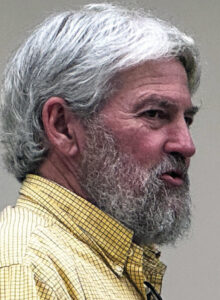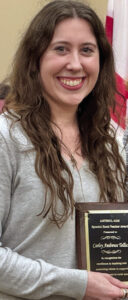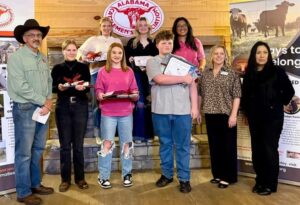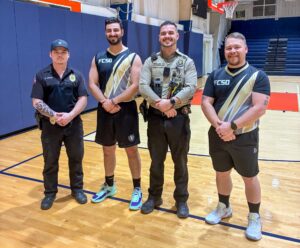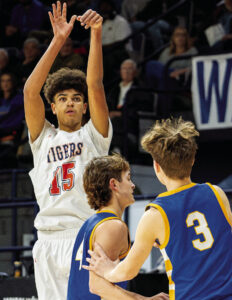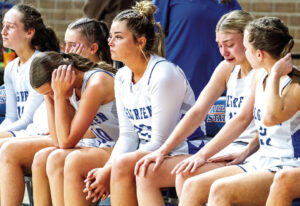Students have first-hand history lesson
On Thursday, students at Russellville High School were able to receive a first-hand history lesson when five Korean War veterans spoke to them about their experiences overseas.
The men are members of the Northwest Alabama Korean War Veterans Chapter Two, the second oldest chapter in the nation, and are all local residents of either Franklin, Colbert or Lauderdale counties who travel to different schools and educate students on the Korean War.
Veteran Bill Gober, from Vina, said they believed it was their duty to tell people what happened.
“There’s hardly anything about Korea in the history books,” Gober said. “Most people don’t know what really happened, and if we don’t talk about it and get it out, the history won’t get told.”
Lt. Col. (retired) Norman Lier, Senior Army instructor at RHS, said the politicians and media called it the Korean Conflict because the U.S. never officially declared war, but he disagreed.
“They may have thought of it as a police action, but it was a war,” Lier said. “When somebody is shooting at you and your life is on the line, that’s a war.”
The five veterans all spoke to the students about their different experiences. Some served in the Army, some in the Navy, and Gober served with the Marine Corp.
“I had graduated from Vina and had gone to Detroit to work at the Ford Motor Company when I got my draft notice from the selective service,” Gober said. “When the war in Korea started, me and a buddy of mine who was going to school in Birmingham decided to join up with the Marines.”
Gober said he served in the 1st Tractor Battalion in the 1st Marine Division, which was in charge of landing troops and shipping the shore. He arrived in Korea in September of 1950 and has the distinction of being a survivor of Chosin Reservoir.
“Around 100,000 Chinese soldiers encircled our Marine division when we reached the Chosin Reservoir and we realized we were in trouble,” Gober said. “On top of being surrounded, the temperature dropped to 40 below zero.
“Gen. (Oliver P.) Smith decided we were going to fight our way out and from the 10th of December till the 24th of December we had to walk 65 in the freezing cold.”
Gober said during this time they weren’t able to take baths and had very little to eat. Most of the time their meals consisted of two crackers, a can of jam and a can of assorted fruit.
“Everything else was frozen solid because of the temperature,” he said.
Gober said they also had very little sleep during this time because hypothermia could set in and if someone wasn’t there to wake you up, you might not.
“Around 4,000 soldiers lost their hands and feet to frostbite, and I consider myself very lucky to still have mine. It’s just hard to explain how you survived something like that.”
Jim Taylor, who serves as president of the Northwest Alabama Korean War Veterans Chapter Two, served in the U.S. Navy from 1951 until 1962.
During the war, Taylor was stationed above the 38th Parallel on a LST 735 mine sweep control ship, which made sure the shore lines were free of mines.
Taylor said the reason the Korean War is often forgotten is because World War II occurred shortly before and Vietnam occurred shortly after, and both those wars were well publicized.
“When people talk about the wars this country has been involved in, Korea is frequently left out and it’s just hard for us that were there to buy that,” Taylor said.
“To put things into perspective, 54,000 soldiers were killed in Korea in just 37 months as opposed to 58,000 soldiers killed in Vietnam in a 10-year time span. That just shows you how bloody this war was.”
William Gotcher, whose family lived in Franklin County for years, was a member of the U.S. army and served on the front line during the Korean War.
He operated 50 caliber machine guns and can remember, like Gober, how terrible the conditions were.
“I spent the winter of 1951 over there and I can remember having to put my boots between my knees and pull to get them off because my feet would be frozen to my socks,” Gotcher said.
The veterans who spoke never touted themselves as heroes, but Lier said they were just too modest.
“These are ordinary men who did extraordinary things for our country,” Lier said. “When our nation needed them, they stopped what they were doing and served the nation with honor, dignity and sacrifice. Every one of them is an American hero.”


